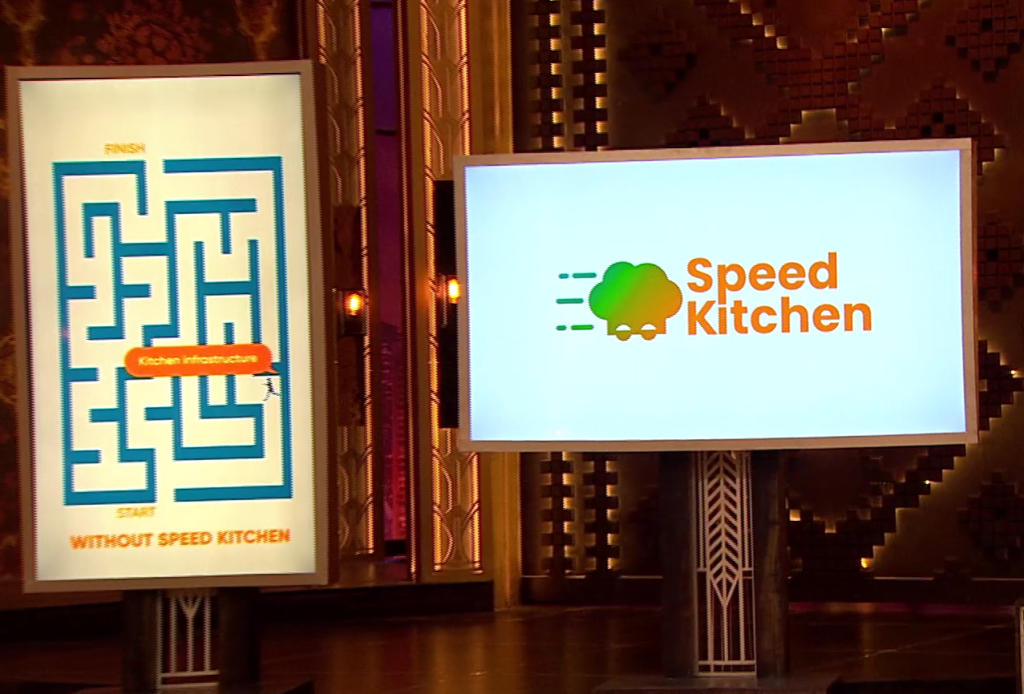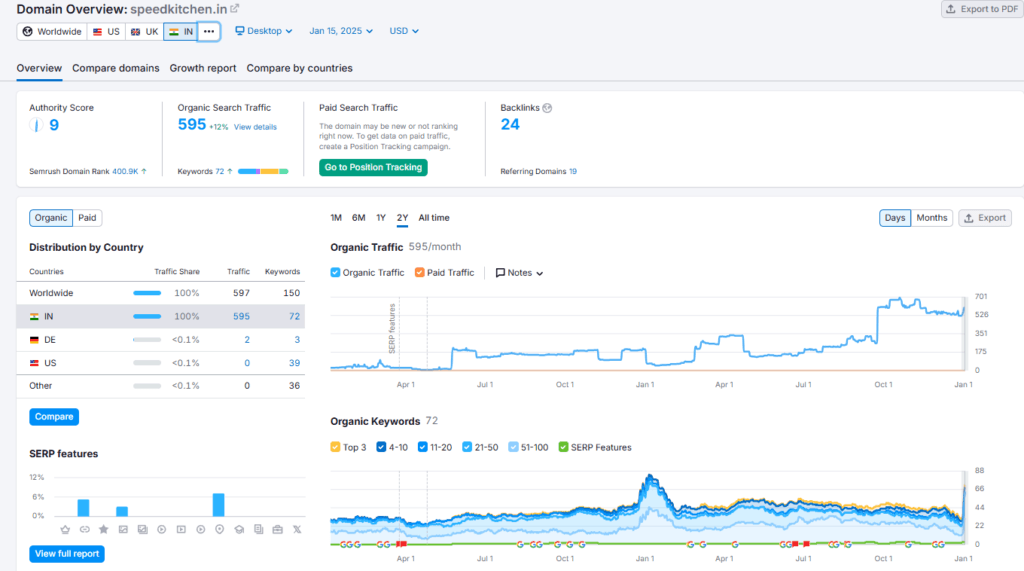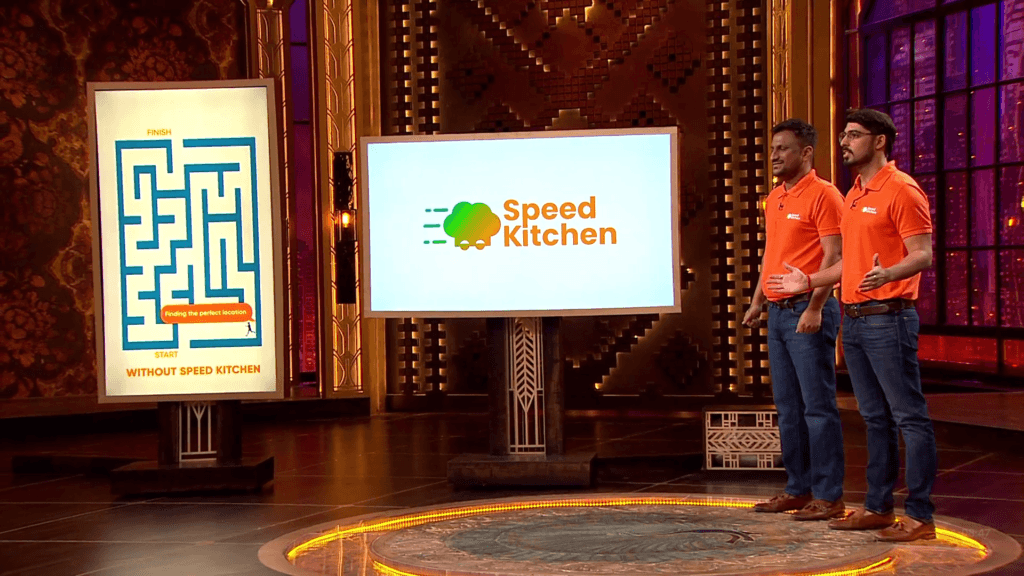Speed Kitchen Shark Tank India Episode Review
Website Information
- Website:- Speed Kitchen
- Build on CMS WordPress
- SEO Improvement is needed.
- ORGANIC TRAFFIC: 595 visitors per month.
Founder
- Speed Kitchen was co-founded by Paurav Rastogi and Shamin Kapoor, childhood friends from Delhi. Paurav, a civil engineering graduate from VIT Vellore, previously held a significant role at OYO, where he gained insights into the challenges of setting up traditional restaurants.
- Shamin, an MBA graduate with expertise in performance marketing from Housing.com, complements Paurav’s experience with his marketing acumen.
- Together, they leverage their backgrounds to drive the growth and success of Speed Kitchen.

Brand Overview
- Speed Kitchen is an innovative startup based in India that simplifies the process of launching cloud kitchens for food brands.
- Founded in March 2021, it has quickly established itself in the food tech industry, operating across four cities with over 130 kitchens serving more than 50 brands, including well-known names like Haldiram and Chaayos.
- Speed Kitchen operates on a unique model that allows food brands to launch their operations in just four days with minimal capital investment.
- The company focuses on providing ready-to-operate cloud kitchens, thus enabling entrepreneurs to bypass the complexities of securing licenses and managing physical infrastructure.
- The brand’s revenue-sharing model further reduces financial barriers for new entrants in the food industry.
Shark Tank India Appearance and Ask
- In January 2025, Speed Kitchen appeared on Shark Tank India, seeking ₹2.5 Crores for 10% equity, valuing the business at ₹25 Crores.
- The founders presented their operational model and impressive financial growth during their pitch.
Season and Episode Air Date
- Season: 04
- Episode:- 07
- Episode Air Date: Tuesday, 14 January 2025
Product Overview
Speed Kitchen provides a comprehensive solution for food brands looking to enter the market quickly. Their services include:
- Revenue Sharing Model: Brands pay a percentage of their net sales.
- Low Setup Costs: Brands supply their own equipment while Speed Kitchen manages maintenance and security.
- Shared Spaces: Multiple brands can operate from a single kitchen.
Investor Reactions
- Investor reactions during the Shark Tank pitch were mixed initially; however, the founders’ detailed knowledge of their business and ethical approach eventually won over several sharks.
- Notably, Kunal Bahl highlighted the importance of tackling difficult aspects of business for sustainable growth.
Customer Engagement Philosophy
- Speed Kitchen emphasizes a customer-centric approach by allowing brands to focus on their core business without being burdened by operational challenges.
- This philosophy not only enhances brand engagement but also fosters collaboration among various food startups within their network.
Product Highlights
Key features of Speed Kitchen include:
- Rapid setup time: Brands can start operations within four days.
- Minimal upfront costs due to shared infrastructure.
- A robust client base that includes both established names and emerging startups.
Future Vision
- With the recent funding from Shark Tank India, Speed Kitchen aims to expand its operations into more cities, particularly targeting high-density urban areas.
- The founders plan to strengthen their operational model to enhance scalability and profitability while diversifying their portfolio through partnerships with new food brands.
- Speed Kitchen is redefining the cloud kitchen landscape in India by providing an efficient and cost-effective solution for food entrepreneurs looking to grow their businesses without traditional barriers.
Deal Finalized or Not
- After initial negotiations and multiple offers from the sharks, Speed Kitchen secured a deal for ₹2 Crores in exchange for 6% equity, valuing the company at ₹33.33 Crores.
- The final offer was made collectively by Ritesh Agarwal, Azhar Iqbal, and Kunal Bahl after extensive discussions.

Speed Kitchen Overview in Tabular Format
| Category | Details |
|---|---|
| Website Information | |
| Website | Speed Kitchen |
| CMS Platform | WordPress |
| SEO Improvement Needed | Yes |
| Organic Traffic | 595 visitors per month |
| Founder Information | |
| Founders | Paurav Rastogi and Shamin Kapoor |
| Background – Paurav | Civil engineering graduate from VIT Vellore, former OYO executive. |
| Background – Shamin | MBA graduate with expertise in performance marketing from Housing.com. |
| Complementary Skills | Paurav (operations expertise), Shamin (marketing acumen). |
| Brand Overview | |
| Founded | March 2021 |
| Focus | Simplifying cloud kitchen setups for food brands. |
| Operations | 4 cities, 130+ kitchens, serving 50+ brands (e.g., Haldiram, Chaayos). |
| Business Model | Revenue-sharing model with ready-to-operate kitchens, low setup costs, and shared spaces. |
| Shark Tank India Appearance | |
| Air Date | 14 January 2025 |
| Ask | ₹2.5 Crores for 10% equity (valuation: ₹25 Crores). |
| Final Deal | ₹2 Crores for 6% equity (valuation: ₹33.33 Crores). |
| Investors | Ritesh Agarwal, Azhar Iqbal, Kunal Bahl |
| Product Overview | |
| Revenue Model | Brands pay a percentage of net sales. |
| Setup Cost | Brands supply equipment; Speed Kitchen handles maintenance and security. |
| Shared Spaces | Multiple brands operate from single kitchens. |
| Key Features | Rapid setup (4 days), minimal costs, and shared infrastructure. |
| Market Potential | |
| Cloud Kitchen Market Size | ₹1.05 lakh Crores by 2025 (CAGR: 12% from 2020-2025). |
| Food Delivery Growth | 30% annual growth due to changing consumer habits and smartphone penetration. |
| TAM | ₹60,000 Crores |
| Target Audience | Young professionals (20-35 years), tech-savvy urban dwellers, and small/medium food brands. |
| Marketing Strategy | |
| Brand Awareness | Social media campaigns on Instagram and Facebook. |
| Influencer Collaborations | Partner with food bloggers and influencers. |
| Content Marketing | Blogs, videos, and infographics showcasing success stories. |
| SEO Optimization | Targeted keywords for organic visibility. |
| Email Marketing | Newsletters featuring industry insights, client stories, and offers. |
| Distribution Partnerships | Collaborate with Zomato and Swiggy for streamlined order processing. |
| Challenges | |
| Competition | Increasing players in the cloud kitchen market. |
| Operational Scalability | Significant investment required for new cities. |
| Future Vision | |
| Short-term Goals (1 Year) | Expand to 2 more metropolitan cities; increase partnerships by 50%. |
| Medium-term Goals (2-3 Years) | Achieve 30% revenue growth annually; develop proprietary kitchen management tech. |
| Long-term Goals (5 Years) | Valuation of ₹100 Crores; diversify services (e.g., catering). |
| Reasons for Success | |
| Growing Demand | Rising reliance on food delivery services. |
| Founders’ Expertise | Strong backgrounds in operations and marketing. |
| Customer-Centric Approach | Enables brands to focus on business growth by removing operational challenges. |
Speed Kitchen Shark Tank India Business Plan

Business Potential in India
- Market Size: The cloud kitchen market in India is projected to reach ₹1.05 lakh Crores by 2025, growing at a CAGR of 12% from 2020 to 2025.
- Food Delivery Growth: Online food delivery is expected to grow at a rate of 30% annually, driven by changing consumer habits and increased smartphone penetration.
- Urbanization Rate: With urbanization projected to reach 600 million people by 2031, demand for convenient food solutions will rise.
Total Addressable Market (TAM)
- TAM Estimation: The total addressable market for cloud kitchens in India is estimated at ₹60,000 Crores, considering the growing demand for food delivery services among urban consumers.
- Market Segmentation: Includes established restaurants looking to expand digitally and new entrants in the food industry.
Ideal Target Audience and Demographics
- Target Audience:
- Young professionals aged 20-35 years living in urban areas.
- Small to medium-sized food brands looking for cost-effective solutions to enter the market.
- Demographics:
- Tech-savvy individuals who prefer online food delivery.
- Entrepreneurs seeking to minimize operational complexities.
Marketing Strategy
- Brand Awareness Campaigns: Utilize social media platforms like Instagram and Facebook to reach potential clients and consumers.
- Influencer Collaborations: Partner with food bloggers and influencers to showcase client brands operating from Speed Kitchen facilities.
Content and Digital Marketing Strategy
- Engaging Content Creation: Develop blogs, videos, and infographics that highlight success stories of brands using Speed Kitchen.
- SEO Optimization: Use targeted keywords related to cloud kitchens and food delivery services to improve organic search visibility.
- Email Marketing Campaigns: Regular newsletters featuring industry insights, client success stories, and promotional offers.
Distribution Strategy
- Partnerships with Delivery Platforms: Collaborate with major food delivery apps like Zomato and Swiggy for streamlined order processing.
- Direct Sales Approach: Engage directly with potential clients through sales representatives who can demonstrate the benefits of Speed Kitchen’s model.
Advantages
- Rapid Setup Time: Brands can start operations within four days.
- Low Capital Investment: Minimal upfront costs due to shared infrastructure.
- Scalability Potential: Ability to host multiple brands under one roof increases operational efficiency.
Challenges
- Market Competition: Increasing number of players entering the cloud kitchen space may dilute market share.
- Operational Scalability: Expanding into new cities requires significant investment in real estate and operational expertise.
Reasons for Success
- Growing Demand for Cloud Kitchens: Increased reliance on food delivery services creates a favorable environment for Speed Kitchen’s business model.
- Strong Founders’ Backgrounds: The combined experience of Paurav and Shamin positions Speed Kitchen for effective execution and growth.
Mitigation Strategies
- Diversification of Client Base: Expand partnerships with various food brands to reduce dependency on a few key clients.
- Continuous Market Research: Stay ahead of trends in consumer preferences and adapt offerings accordingly.
Future Business Roadmap
- Short-term Goals (1 Year):
- Expand operations into two additional metropolitan cities.
- Increase brand partnerships by 50%.
- Medium-term Goals (2–3 Years):
- Achieve revenue growth of 30% annually through enhanced marketing strategies.
- Develop proprietary technology for better kitchen management systems.
- Long-term Goals (5 Years):
- Aim for a valuation of ₹100 Crores by diversifying service offerings beyond cloud kitchens (e.g., catering services).
- Establish Speed Kitchen as a leading name in the Indian food tech industry through strategic partnerships and innovation.
By leveraging its unique business model, strong founding team, and the growing demand for cloud kitchens, Speed Kitchen is poised for significant growth in the Indian food market.


Speed Kitchen Shark Tank India Episode Review